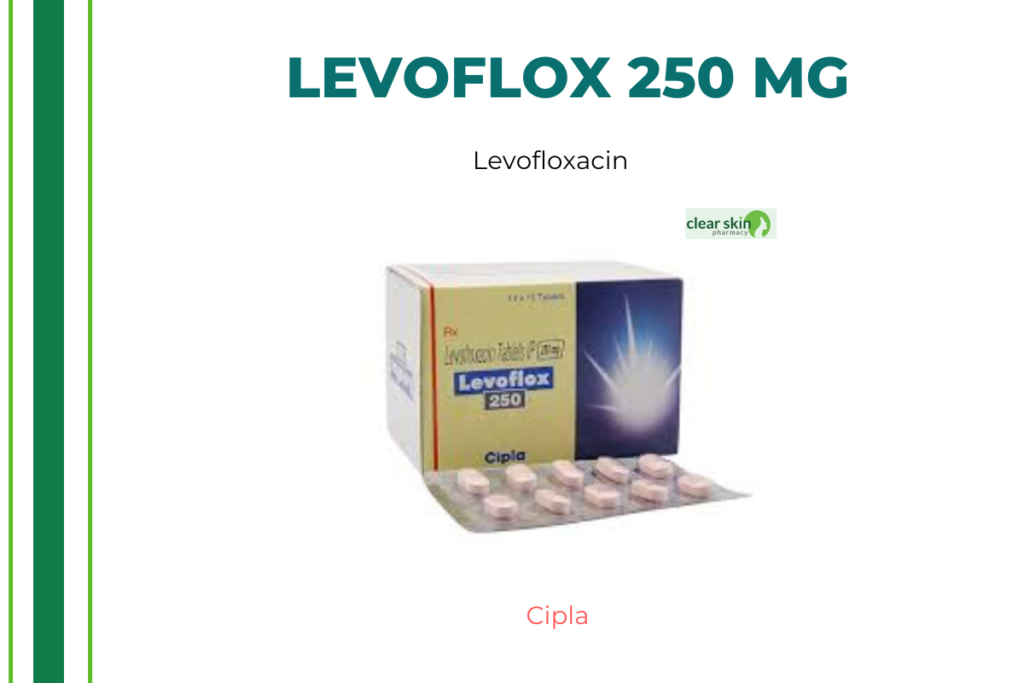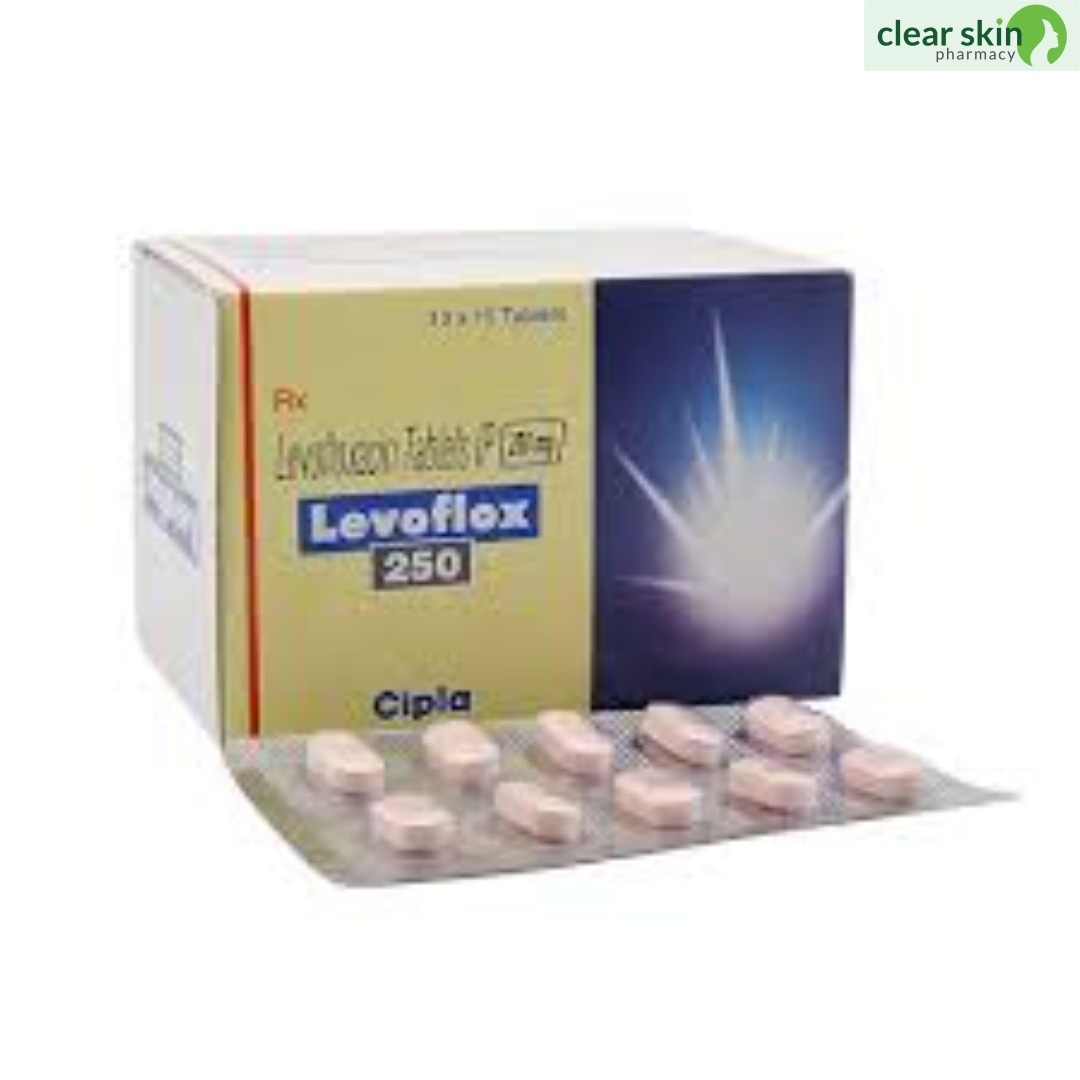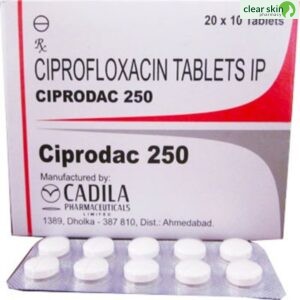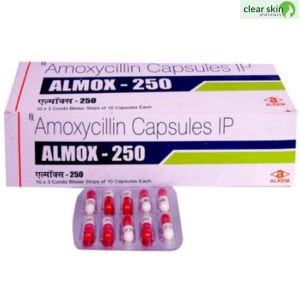Levoflox 250 mg
The fluoroquinolone antibiotic Levoflox 250 mg belongs to the third generation. It is a potent antibiotic that is effective against a wide variety of bacteria. Levoflox 250 mg is used to treat a variety of bacterial infections, including as acute pneumonia (lung infection), bronchitis (inflammation of the bronchial tubes), skin infections, and urinary tract infections. A bacterial infection is a bacterial infection that occurs within the body. It may target any part of the body and replicate rapidly.
Bacteria that are toxic to humans can cause illness and proliferate rapidly within the body. Toxins are chemicals produced by pathogenic bacteria that can cause tissue damage and illness. Levoflox 250 mg binds to the enzymes responsible for bacterial division (Topoisomerase IV and DNA gyrase) and inhibits bacterial multiplication, hence killing the germs.
Utilize Levoflox 250 mg as prescribed by your physician, preferably with a meal to avoid stomach upset and at regular times throughout the day. Levoflox 250 mg dosage may vary according on the patient’s health and the severity of the infection. In addition, even if you feel better, it is recommended that you complete the whole course of treatment, since quitting in the middle may result in a more severe infection that no longer responds to the antibiotic (antibiotic resistance). Levoflox 250 mg may cause nausea, vomiting, diarrhoea, sleeping problems, and allergic reactions. Everyone does not have to endure the aforesaid negative effects. Consult a physician if you develop any pain.
Before beginning Levoflox 250 mg, please inform your doctor if you are allergic to any antibiotic or if you have kidney or liver disease. Self-medication with Levoflox 250 mg may lead to antibiotic resistance, which is the ineffectiveness of antibiotics against specific bacterial infections. Levoflox 250 mg is also safe for use during pregnancy and breastfeeding if prescribed by a physician.
Treatment of Pneumonia with Levoflox 250 Tablet 10 (Fluid buildup in lungs).
Chronic bronchitis (bronchitis) (swelling of airways and lung passages).
Prostatitis is a disorder affecting men (swelling of prostrate gland).
Acute Pyelonephritis (Kidney inflammation).
Urinary tract contamination
The Pandemic (Communicable bacterial infection)
The progression of anthrax infection is slowed down.
Endocarditis.
Meningitis.
Pelvic inflammatory condition (PID)

Medicinal Advantages
The antibiotic Levoflox 250 mg is used to treat bacterial infections such as pneumonia (fluid in the lungs), urinary tract infection, bladder infection, prostate gland infection, and skin infection. Levoflox 250 mg inhibits bacteria, which are then eliminated by the body’s defense cells. Levoflox 250 mg also kills bacteria by modifying their inner cellular components, which aids in the fight against illness and carries a lesser risk of causing bacterial resistance than other antibiotics.
Use Instructions
At the beginning of a meal or immediately before, the tablet should be taken with a full glass of water. The dosages should be separated by at least four hours throughout the day. It is neither to be eaten nor crushed. If you cannot stomach the full tablet, divide it in half and take each half separately.
Storage
Place in a cool, dry area out of direct sunlight.
Levoflox 250 Tablet 10’s Side Effects
The majority of adverse effects of Levoflox 250 mg do not require immediate medical attention and will subside with time. However, if the side effects continue, see your physician. Among the most prominent adverse effects are:
Nausea and vomiting are typical adverse reactions.
Constipation, diarrhea, and indigestion are all signs of indigestion.
Sleeping issues.
Certain individuals are allergic to levofloxacin or any of the other components of this medication. Inform your physician if you have an allergy to any antibiotic, especially the Levofloxacin antibiotic family. Although not everyone may experience these side effects, a doctor’s visit is advised if any of them persist.
Drug Recommendations
If you are allergic to or have had a serious reaction to fluoroquinolone antibiotics such as delafloxacin, gemifloxacin, ofloxacin, moxifloxacin, or ciprofloxacin, do not use Levofloxacin. Tendonitis (inflammation of the connective tissue between a bone and a muscle) and tendon rupture are potential adverse effects of Levofloxacin (tearing of a fibrous tissue that connects a bone to a muscle). Inform your doctor if you have or have had a kidney, heart, or lung transplant, renal illness, rheumatoid arthritis (an inflammatory condition that causes pain, swelling, and loss of function in the joints), seizures (fits), or epilepsy, or if you participate in regular physical activity. Patients with myasthenia gravis (a disease of the neurological system characterized by muscle weakness) may have a worsening of their muscular weakness if they take, which may result in severe breathing difficulties or death. Along with Levoflox 250 mg, it is advised to avoid dairy products. Additionally, exposure to sunlight should be avoided when using Levofloxacin, since it may enhance phototoxicity or photosensitivity. Before using Levoflox 250 mg, epilepsy patients with an irregular heartbeat should inform their physician (QT prolongation).
Interactions Between Drugs
Pain relievers (NSAIDs), acidity relievers (cimetidine), anti-tuberculosis drugs (probenecid), immunosuppressant drugs (cyclosporin), anti-bacterial drugs (macrolides), blood sugar lowering drugs (insulin, glibenclamide), blood thinners (warfarin), and anticonvulsant medications are incompatible with Levoflox 250 Tablet 10’s (Phenytoin, valproate).
Due to a drug-food interaction, levofloxacin should not be used with dairy products such as milk or yogurt.
In conditions such as colitis, myasthenia gravis, tendinitis, excessive blood sugar (diabetes), hemodialysis (kidney dialysis), renal failure, and nerve disease, levofloxacin should only be provided under the supervision of a physician.
Safety Suggestions
ALCOHOL
Alcohol is not known to have harmful side effects when used with Levoflox 250 mg. However, consuming alcohol while using Levofloxacin may cause liver damage. Levofloxacin should thus not be used with Levoflox 250 mg.
PREGNANCY
It is unknown whether Levofloxacin will cause damage to a pregnant woman or her unborn child. If you are pregnant or expect to become pregnant, you should avoid using Levofloxacin unless your doctor recommends otherwise.
BREAST FEEDING
Before using this drug, a doctor’s guidance is needed. Human milk includes the secreted antibiotic levofloxacin. On the other hand, the amount of Levofloxacin absorbed by a breastfed infant is unknown.
DRIVING
This medicine may cause side effects such as dizziness, weariness, a spinning sensation (vertigo), and visual abnormalities. If this occurs, do not drive or perform any other task that requires intense concentration.
LIVER
If you have a history of liver disease or disorder, take levofloxacin with caution. If you have nausea, vomiting, loss of appetite, urine that is black in color, or yellowing of the skin or eyes, your doctor may need to adjust your dosage.
KIDNEY
If you have a history of renal disease or disorder, use Levofloxacin with caution. Your physician may need to adjust the dosage.
No habit formation
Advice on Diet and Lifestyle
Milk, yogurt, and other dairy products should be avoided at least two hours before and after taking the medication.
It is essential to maintain a clean atmosphere.
Increase the number of high-fiber foods in your diet since they are simpler for your gut bacteria to digest, hence promoting their development. Therefore, diets high in fiber may assist in the restoration of healthy gut flora after antibiotic therapy.
After completing a course of levofloxacin, probiotics should be used to restore any beneficial bacteria that may have been lost in the intestines. Probiotics can minimize the incidence of antibiotic-associated diarrhea, which is increased by antibiotic treatment.
Recommendations
Prior to initiating therapy with Levofloxacin, the following factors should be considered:
Limit exposure to direct sunlight or artificial UV rays during treatment with Levoflox 250 mg and for 48 hours after treatment has ended (e.g. sunlight).
Remove your contact lenses and lay them aside for at least 15 minutes before using eye drops containing 250 milligrams of Levoflox.
Monitor liver function tests (LFT), renal function tests, white blood cell count, and blood glucose levels in diabetic patients since Levofloxacin may cause unfavorable interactions.
Other details : This item is non-refundable.
Glossary of Diseases and Conditions
Dangerous germs infect us when they invade our bodies, proliferate, and infect us. It may target any part of the body and replicate rapidly. When you are infected with bacteria, you may have nonspecific symptoms such as fever, chills, and fatigue. The most frequent bacterial morphologies are spherical, rod-like, and spiral-shaped. Bacterial infections vary from minor symptoms like sore throats and ear infections to severe disorders like meningitis and encephalitis. Streptococcus, Staphylococcus, and E. coli are among the pathogenic microorganisms. A bacterial infection is capable of affecting anyone, at any moment. Those whose immune systems are compromised or who take immunosuppressive drugs are more prone to bacterial infection.
FAQs
Levoflox 250 milligrams may cause diarrhea. It is an antibiotic that eliminates pathogenic microorganisms. However, it causes diarrhea by disrupting the healthy bacteria in the digestive tract. Consult your doctor if you’re experiencing severe diarrhea.
If you miss a dose, take it as soon as you remember, and avoid taking a double dose to make up for it, since this might cause hazardous adverse effects. If it is too late to take the missed dose, it is recommended to skip it and move on to the following one.
It is not recommended that you discontinue this medicine before completing the prescribed course. Due to the resistance that bacteria develop when the treatment course is not finished, subsequent infections may be difficult to cure with Levofloxacin if the patient stops taking this medication on his or her own.
Levofloxacin is perfectly safe to take with contraceptives, since no adverse or dangerous interactions have been identified.
Although no detrimental effects on the fetus have been recorded, pregnant women should see a physician prior to using Levofloxacin.








Be the first to review “LEVOFLOX 250MG 10 Tablets”